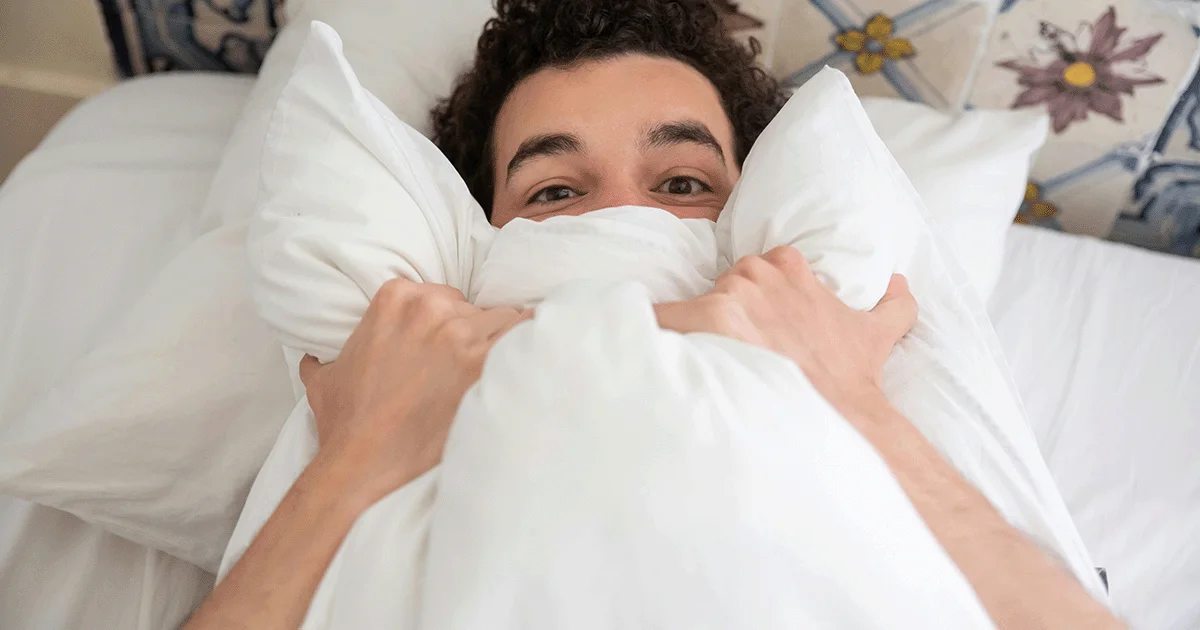Here's what we'll cover
Here's what we'll cover
It’s a common scenario. You’re sitting in class or a meeting at the office. Seemingly out of nowhere, you feel a familiar rush of swelling and fullness below the belt. Your pants feel tighter and suddenly you’re hyperaware of your penis. It's not the right time or place for a surprise boner. So, how do you get rid of an unwanted erection?
How to get rid of a boner
Sudden and spontaneous erections are inevitable but perfectly normal. They may happen any time, any place––not just during sex or masturbation.
But just because it’s normal doesn’t mean it’s convenient. You probably don’t want an erection, say, while you’re meeting with your boss, shopping at the grocery store, or taking an exam. When an erection springs up at an inopportune time, here are seven ways to get rid of it.
1. Masturbate
Masturbating and ejaculating is an almost foolproof way to get rid of an erection. The obvious downside to this method is if you’re in a place or situation where it’s not ideal (or legal) to masturbate.
2. Think about something else
Focus on anything else. Thinking about your unwanted boner won’t make it disappear, and it may actually make it worse. Traditional remedies of thinking “unsexy” thoughts or focusing on a weird or disturbing idea works for some people. Others find complex thoughts work even better. Do some mental math, work through a brain teaser or puzzle, or count backwards from 1,000 in sevens and your erection might lose interest.
3. Cool off
Literally. Cold temperatures can tame an unwanted boner by decreasing blood flow to your penis. A cold shower or bath may be a good solution if you’re at home. You can also escape to a bathroom and splash some cold water onto your face and hands. Another tactic is holding a cold drink or objects on your lap (note: this probably won’t work if you find cold sensations arousing).
4. Keep calm
Sometimes calming techniques will do the trick. Relax your body and clear your thoughts. Do some breathing exercises. You don’t need to do anything fancy; just focus on taking deep breaths in and out. You can also try mindfulness, meditation, or wellness apps to ease the tension and help you focus.
5. Work it out
Light exercise can get rid of a boner. A quick walk, light jog, jumping jacks, or a bicycle ride are all great options. These activities will divert blood away from your penis and to the muscles activated in whatever physical activity you’re doing. You may have seen a similar technique in a viral 2021 TikTok featuring a doctor who describes how flexing a muscle can get rid of a boner.
6. Change position
Stand up if you’re sitting or uncross your legs. Reach into your pocket and discretely reposition your boner so nothing rubs against it.
7. When all else fails…wait it out
Sometimes all that unwanted boner needs is time. Erections can last for a few minutes up to a half-hour. If nothing else works, it will eventually disappear on its own.
Why do random boners happen?
There’s a reason you think your penis has a mind of its own. Your penis may stay down when you want it up, or spontaneously stand at attention when you least expect. Here are three reasons why surprise erections occur (NHS, 2021; Krassioukov, 2017).
Nocturnal erections: Also called penile tumescence, this is when erections occur while you sleep or right when you wake up (aka “morning wood”). Nocturnal erections can happen 3–5 times a night but fade away as you get older. Conditions like diabetes, heart disease, and erectile dysfunction can decrease the amount of nocturnal erections you get, so it’s a good idea to talk to a healthcare provider if you stop having morning wood.
Reflexogenic erections: This type of erection results from something touching your genitals. Even just the feel of clothes brushing against you may be enough to trigger an unwanted boner.
Psychogenic erections: These are erections you get from arousing thoughts, like when you’re fantasizing or watching porn.
When is it a problem?
An unexpected boner may be an inconvenience, but it’s usually not a problem.
It’s a good idea to talk to a healthcare professional if you have an erection that lasts longer than four hours. A prolonged, painful erection that lasts even when you’re not aroused is known as priapism. It may need to be treated quickly to avoid damage to the penis.
DISCLAIMER
If you have any medical questions or concerns, please talk to your healthcare provider. The articles on Health Guide are underpinned by peer-reviewed research and information drawn from medical societies and governmental agencies. However, they are not a substitute for professional medical advice, diagnosis, or treatment.
Krassioukov, A. & Elliott, S. (2017). Neural Control and Physiology of Sexual Function: Effect of Spinal Cord Injury. Topics in Spinal Cord Injury Rehabilitation , 23 (1), 1–10. doi:10.1310/sci2301-1. Retrieved from https://www.ncbi.nlm.nih.gov/pmc/articles/PMC5340504/
Podlasek, C. A., Mulhall, J., Davies, K., Wingard, C. J., Hannan, J. L., Bivalacqua, T. J., et al. (2016). Translational Perspective on the Role of Testosterone in Sexual Function and Dysfunction. The Journal of Sexual Medicine , 13 (8), 1183–1198. doi:10.1016/j.jsxm.2016.06.004. Retrieved from https://www.ncbi.nlm.nih.gov/pmc/articles/PMC5333763/
Sachs, B. D. (1995). Placing erection in context: the reflexogenic-psychogenic dichotomy reconsidered. Neuroscience and Biobehavioral Reviews , 19 (2), 211–224. doi:10.1016/0149-7634(94)00063-7. Retrieved from https://pubmed.ncbi.nlm.nih.gov/7630577/
Schiavi, R. C. & Schreiner-Engel, P. (1988). Nocturnal penile tumescence in healthy aging men. Journal of Gerontology , 43 (5), M146–M150. doi:10.1093/geronj/43.5.m146. Retrieved from https://pubmed.ncbi.nlm.nih.gov/3418036/
Schiavi, R. C., White, D., Mandeli, J., & Schreiner-Engel, P. (1993). Hormones and nocturnal penile tumescence in healthy aging men. Archives of Sexual Behavior , 22 (3), 207–215. doi:10.1007/BF01541766. Retrieved from https://pubmed.ncbi.nlm.nih.gov/8494488/
Silberman, M., Stormont, G., & Hu, E. W. (2021). Priapism . [Updated Jun 16, 2021]. In: StatPearls [Internet]. Retrieved from https://www.ncbi.nlm.nih.gov/books/NBK459178/
United Kingdom National Health Service (NHS). (2021). 5 Penis Facts . Retrieved from https://www.nhs.uk/live-well/sexual-health/five-penis-facts/
Youn, G. (2017). Why do healthy men experience morning erections? The Open Psychology Journal , 10 (1), 49–54. doi:10.2174/1874350101710010049. Retrieved from https://openpsychologyjournal.com/VOLUME/10/PAGE/49/FULLTEXT/











